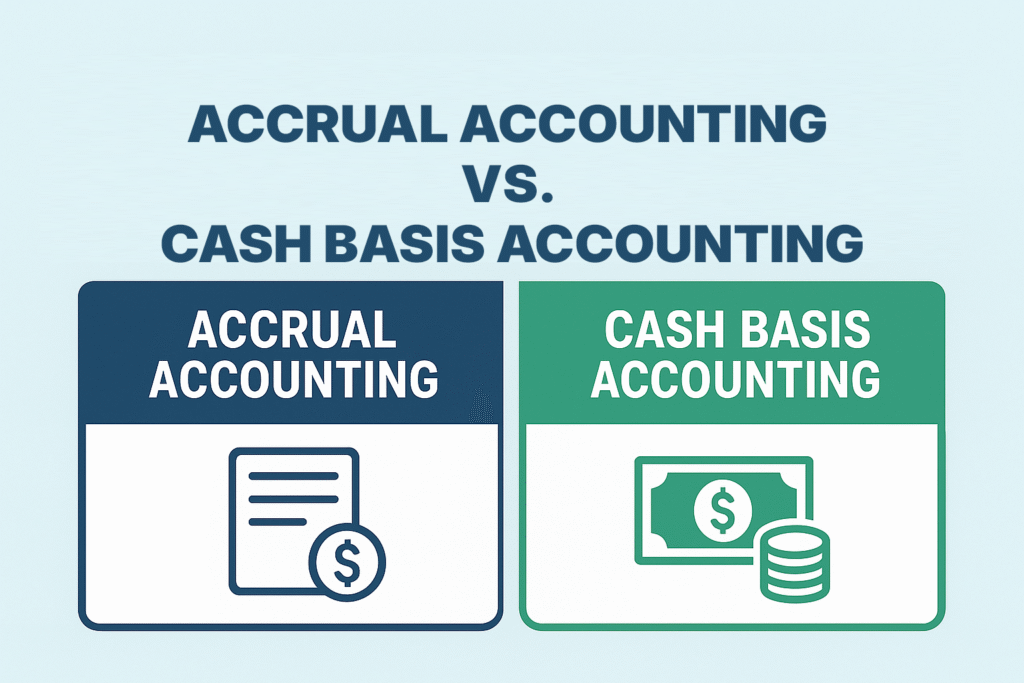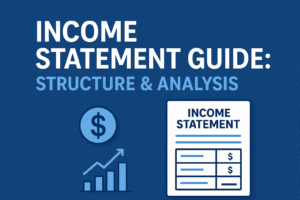When it comes to tracking business finances, choosing the right accounting method can significantly influence financial reporting, tax obligations, and decision-making. Two of the most widely recognized approaches are accrual accounting and cash basis accounting.
While both methods aim to measure a company’s financial performance, they differ in when transactions are recorded, how revenues and expenses are recognized, and the level of detail they provide. Understanding these differences is crucial for business owners, accountants, and financial managers to ensure compliance with IRS accounting method rules, maintain accurate records, and make well-informed operational decisions.
Accrual Accounting
Accrual accounting records revenues and expenses when they are earned or incurred, regardless of when cash changes hands. This method follows the matching principle, which means revenues and related expenses are recorded in the same accounting period.
Key characteristics of accrual accounting:
- Revenue recognition occurs when goods are delivered or services are rendered, not when payment is received.
- Expense recognition happens when the cost is incurred, not when it’s paid.
- Accounts receivable and accounts payable are integral components.
- Provides a more accurate financial picture for stakeholders.
Example:
If you deliver a service in December but receive payment in January, under accrual accounting, the revenue is recorded in December.
Advantages:
- More realistic financial performance measurement.
- Better for long-term financial planning.
- Required by Generally Accepted Accounting Principles (GAAP) for most businesses.
Disadvantages:
- More complex and time-consuming.
- Requires tracking receivables, payables, and adjustments.
Cash Basis Accounting
Cash basis accounting records revenues when cash is received and expenses when cash is paid. It’s simpler and more straightforward but doesn’t always reflect the full financial position of a business.
Key characteristics of cash basis accounting:
- Revenue is only recognized upon receipt of payment.
- Expenses are only recognized upon actual cash outflow.
- No tracking of receivables or payables.
- Easier for small businesses with straightforward transactions.
Example:
If you deliver a service in December but receive payment in January, under cash basis accounting, the revenue is recorded in January.
Advantages:
- Simple to maintain.
- Easy to understand for non-accountants.
- Cash flow tracking is more direct.
Disadvantages:
- Doesn’t match revenues with related expenses.
- Not compliant with GAAP for most corporations.
- Can distort financial results if payments are delayed or made early.
Key Differences Between Accrual and Cash Basis Accounting
- Timing of Revenue/Expense Recognition
- Accrual: Recognizes income and expenses when earned/incurred.
- Cash: Recognizes income and expenses when cash changes hands.
- Complexity
- Accrual: Requires more bookkeeping detail, adjustments, and accounting knowledge.
- Cash: Simpler and less time-intensive.
- Adherence to the Matching Principle
- Accrual: Strictly follows the matching principle.
- Cash: Does not match revenues with corresponding expenses.
- Use of Accounts Payable and Accounts Receivable
- Accrual: Actively uses both AP and AR accounts.
- Cash: Does not track AP or AR.
- Implications for Long-Term Contracts
- Accrual: Allows revenue recognition over the contract’s life.
- Cash: Recognizes revenue only when payments are received.
- Regulatory Compliance
- Accrual: Required by GAAP and IFRS for most medium and large businesses.
- Cash: Generally allowed for smaller businesses under certain revenue thresholds.
- Tax Implications
- Accrual: May result in paying taxes on revenue before receiving cash.
- Cash: Taxes are only paid when income is received.
- Recognition of Unearned Revenue
- Accrual: Records unearned revenue as a liability until earned.
- Cash: Recognizes it as revenue when cash is received.
- Use of Accruals and Deferrals
- Accrual: Adjusting entries are used to account for prepaid expenses, accrued income, and deferred revenues.
- Cash: Does not require accrual or deferral adjustments.
- Use of Depreciation and Amortization
- Accrual: Depreciation and amortization expenses are recorded.
- Cash: These are not typically recorded.
Accrual Accounting vs. Cash Basis Accounting – Quick Comparison Table
| Factor | Accrual Accounting | Cash Basis Accounting |
| Revenue Recognition | When earned, regardless of cash receipt | When cash is received |
| Expense Recognition | When incurred, regardless of payment | When cash is paid |
| Matching Principle | Yes | No |
| Accounts Payable/Receivable | Yes | No |
| Complexity | More complex | Simple |
| Long-Term Contracts | Recognized over project period | Upon payment |
| Regulatory Compliance | Required by GAAP for most businesses | Allowed for small businesses under certain revenue limits |
| Tax Implications | May owe taxes before cash is received | Taxes due only when income is received |
| Unearned Revenue | Recorded as liability | Recognized upon payment |
| Accruals & Deferrals | Required | Not applicable |
| Depreciation & Amortization | Recorded periodically | Typically not recorded |
| Best Suited For | Medium to large businesses | Small businesses |
Special Considerations
- Business Size: Smaller businesses often use cash basis due to simplicity, while larger ones are required to use accrual.
- Industry Requirements: Some industries mandate accrual accounting regardless of business size.
- Financing Needs: Lenders often prefer accrual-based financial statements because they give a more complete view of a company’s performance.
- Regulatory Guidance: Refer to IRS Publication 538 and the U.S. Small Business Administration accounting method guide for official rules and guidance.
Accrual Accounting vs. Cash Basis Accounting: Example
Scenario:
A consulting firm completes a $10,000 project in November, sends the invoice immediately, and gets paid in January.
- Accrual accounting: Revenue is recorded in November (when service is completed).
- Cash basis accounting: Revenue is recorded in January (when payment is received).
This timing difference can affect reported profits, taxes, and decision-making.
What Is Accrual Accounting?
Accrual accounting is a method where revenues and expenses are recorded when they are earned or incurred, not when cash is exchanged. This system ensures that income statements reflect the actual performance in a given period, aligning with the matching principle.
What Is the Difference Between Cash Basis and Accrual Accounting?
The difference lies in timing:
- Accrual records transactions when they happen.
- Cash basis records transactions when money changes hands.
When Does a Company Account for Revenue If It Uses Cash Basis Accounting?
In cash basis accounting, revenue is only recorded when the company physically receives payment—whether by cash, check, or bank transfer—regardless of when the goods or services were provided.







